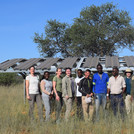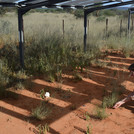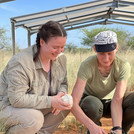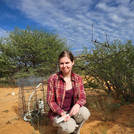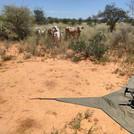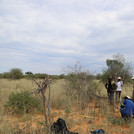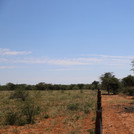March 2024: NamTip researchers complete a successful fieldwork campaign in Namibia
Following the NamTip Kick-Off Meeting in Windhoek, a group of NamTip researchers travelled to Okakarara to visit the project’s study sites and collect data.
Here, they visited the TipEx experimental platform at Hamakari farm, where chosen plots of savanna grassland are artificially pushed over a tipping point by applying simulated grazing (through grass clipping) and drought (through rainout shelters) treatments. Maintenance of the experiment’s infrastructure and treatment application was conducted with the help of local field coordinator Dr. Mark Bilton. Katrin Zimmer from the University of Bonn collected soil samples to analyse potential changes caused by the treatments, which have now been in place for three years. In addition, Vistorina Amputu from the University of Tübingen took photographs from a drone to analyse the dynamics of forage quantity in the experimental plots.
The NamTip researchers also visited additional study sites on the same farm, which had been selected in November 2023 during a preparation trip for an experiment on bush control as a restoration measure for degraded savanna rangelands. On previously marked out plots, woody species were inventoried, vegetation and soil samples were collected, and pictures were taken from drone flights. The vegetation samples, taken by Lisa-Maricia Schwarz , included tree leaf traits, which can be used to identify functional shifts in tree communities in the study areas. The same data was also collected in further study sites in communal rangelands.
Overall, the fieldwork was quite successful, despite the record temperatures that the researchers had to endure (> 37°C). Some additional field activities from project partners are planned also for the months of April and May. For example, Nali Moyo from the Namibia University of Science and Technology (NUST) will be collecting data from exclosure cages previously installed in a restoration experiment, while Diego Menestrey will conduct interviews with communal farmers to investigate local practices of rangeland managements to control desertification. The valuable data collected will flow into the extensive project databases, waiting to be soon analysed and published as part of collaborative papers and PhD theses.

